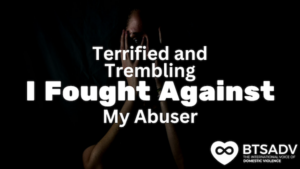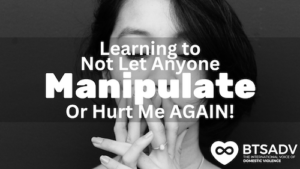
Submitted by: Rick, Survivor
Any form of abuse, regardless of the type, has far-reaching consequences for the children subjected to it. Research shows that trauma impacts not only mental and emotional health but causes physical changes to the brain as well. Consequently, abused children are at higher risk of illness, behavioral problems, and impaired development of motor functions, learning and memory, decision-making, and communication.
Survivor Rick not only lived with domestic violence in the home growing up but also experienced emotional, physical, and sexual abuse at the hand of his father. He shares with us the abuse he endured, how it affected him, and the message he wants us all to hear about standing up for others to protect them from harm. More than this, Rick’s story begs us all to consider the ramifications of not acting when we know someone is being abused.
Rick is 6’4″ and has always been athletic. In his teens, he was a high school basketball and baseball star. As an adult, he lifts weights and has run half-marathons and a full marathon. When Rick tells people about how he was sexually assaulted and that he and his mother were both beaten by his father, people often do not believe him. They may acknowledge his experiences but somehow seem incapable of processing how serious it was. How could he ‘let that happen?’
The effects of abuse permeated all areas of Rick’s life.
The first time Ricks remembers being sexually assaulted by his father was some point before the fourth grade. Although he cannot recall exactly when it began, he remembers the living room where it happened and knows that his family moved out of that house when he was in fourth grade. Rick’s life turned into a never-ending circle of physical and emotional abuse from his father. Sometimes, the abuse was directed at his mother, while at other times, it was toward him. Rick was sometimes paralyzed with fear but occasionally fought back against his father.
By the time he was a teenager, the work in the weight room had made Rick much stronger than his father. His father would still get drunk and try to abuse Rick and his mother, but, usually, he would fight his father off until he fell to the ground. One time, Rick took a punch from him and returned with one that sent his father falling down the stairs. At the time, he had a beer in his hand, and when he fell down the stairs, the beer had somehow stayed in the mug. They all laughed even though it was an unhealthy situation. That was when Rick learned that humor could defuse almost any situation.
Rick always knew that his father’s abuse was a cry for help from a man who felt like a failure. He drank because he struggled to fulfill his role in life. He manufactured affairs that Rick’s mother was allegedly having out of jealousy and lack of confidence. He would attack Rick’s performance in sports and his grades because he knew Rick was a better athlete and student that he was at his age.
Conflict also arose due to a difference in religious beliefs. Rick and his mother are Catholic, but his father was not. The fact that he would try to force them to violate their religious beliefs so he could chase after women was yet another humiliation. Rick was clear about not wanting his mother to stay with his father, and he would never advocate staying with an abuser. He only wanted them to stop living together, have him give up parental rights, and never have the right to remarry. This would have helped protect other women from a similar fate.
Many of the adults in Rick’s life either failed to respond effectively to his situation or – for whatever reason – did not act at all.
While he feels disdain for his father, Rick does not blame him for the suffering he has had in his life as much as he blames others. He is haunted by the adults who, despite knowing about the abuse he suffered, turned a blind eye to what was happening to him.
Some teachers regularly gave him a hard time about unfinished or rushed homework when they knew he was trying to protect his mother from his father the previous night. There were police officers who came to the house and refused to arrest his father for the abuse. His father’s lawyer threatened to fight for custody of Rick during the divorce proceedings. There were even family members on his father’s side who, long after his death, continued to act like he was infallible and perpetuated emotional abuse against Rick.
One of the biggest enablers of the abuse appeared while Rick played basketball in sixth grade. The coaching staff decided that every player on the team would be allowed to start at least one game. It was intended to keep everyone involved and reward players who may not have the talent but put in work trying to improve their skills. The problem was that they also wanted to have each player sit out from at least one game during the season.
Rick was one of the best players on the team, and it was hard for them to have him sit out. Before a weeknight game against a rival team, the coach read the starting lineup, and Rick was not on it. He immediately knew what was going to happen to him on the ride home with his father.
Regardless of how well he did, Rick was always yelled at after basketball games. If he scored twenty points, he was belittled for not getting more rebounds. If he grabbed a lot of rebounds, Rick would get yelled at for the missed free-throw.
Having to sit out for even one game was going to be torture. Rick broke down in tears in the locker room and could not face going out to the gym knowing he had to sit out. He told his coach about his abusive father and that he was going to inevitably face horrific ramifications for the idea he had about making everyone feel better about themselves, even if the coaches had good intentions.
The coach could have allowed Rick to play that night in his usual starting position, but he did not. They could have compromised and moved his non-start day to a different game so Rick could pretend to get injured before playing and still sit out without making the situation worse than it already was. Instead, the coach went up to Rick’s father in the bleachers and tried to explain the non-start rule to his father. Further, the coach told Rick’s father that his son was so afraid that his not playing was going to get him punished that he was in the locker room crying.
After that conversation, Rick’s father had all the ammunition he needed. On the way home from the game, he experienced one of the worst car rides of his life. It was only thirty minutes, but for Rick, it felt like a year. He can still remember sitting in the backseat looking out the window and thinking that they had already passed by certain places.
There was nothing that could be done about the way that his father treated Rick and his mother. She eventually left her husband, but he continued to find ways to abuse them. Teachers, principals, police officers, and coaches, however, should help when they know that abuse is occurring at home.
Throughout middle and high school, Rick’s grades suffered. He barely graduated high school and did not know until the day of graduation that he was going to be getting a diploma. After Rick’s father died, he decided to go to college.
During each of the first four consecutive semesters, he made the Dean’s List and later transferred to the college of his dreams. He was awarded a scholarship for older students who achieve high grades. Rick feels confident that this underscores the potential he could have had as a young student growing up. His teachers were aware of what was happening, and Rick often felt that they decided to deliberately gave him bad grades to cause him trouble.
Eventually, his father’s side of the family disowned him because they said he was too overweight. That was after Rick had endured prolonged verbal abuse from them, causing him to suffer from body dysmorphia. He lost 150 pounds in less than eleven months, and it still was not good enough for them.
As an adult, Rick has faced others who have abused or allowed children to come to harm.
Some of his employers had programs making free therapy sessions available to their employees, and Rick accessed in an attempt to work through some of his trauma. He often felt that not all the staff at such places had his best interests at heart and that others tried to misuse the information they had about his history to charge higher rates.
On one occasion, someone had confessed to Rick that he had engaged in sexually inappropriate behavior with underage girls in a hotel room despite knowing that he was a victim of sexual abuse as a child. Rick tried to report the information to authorities because he felt he could do something to help those young girls.
Later, he approached lawyers about what he had been told. Their response was less than favorable, and they informed him that they could pursue legal action against him for disclosing what he was told. They were aware that Rick had been a victim of sexual abuse as a child, and that he always tried to be an outspoken advocate against those types of behaviors. No action was taken against the person he tried to report.
Rick wanted to share his story to help people understand that you do not have to hit a woman or a child to contribute to their abuse. You may be enabling an abuser by not believing a victim who discloses the abuse to you. Also, you may be unintentionally making things worse for a victim even though you think are doing something nice for them.
“When someone tells you that something is probably going to get them physically harmed, and you do it anyway, you are no different from the person abusing that woman or child. When an abused woman regularly comes to work looking disheveled, first think about why that may be happening before disciplining her for a dress code violation. If a child shows every day in class that he is one of the smartest kids at school but never seems to have his homework completed, try to find out if there is a reason for that.
“Do not think, ‘That is not my problem.’ It is everybody’s problem. If you are putting a woman or child in a position where they will be beaten, you are also their abuser.”
**If you or someone you know is in an abusive relationship, there is help. You can visit the Break the Silence website at www.breakthesilencedv.org, chat with one of our helpline advocates at 855-287-1777, or send a private message through our Facebook page.
========
What’s YOUR Raw Truth?
Sharing our stories can be incredibly empowering while also helping others connect with survivors who have similar experiences. If you are inspired to share your story with us, complete the form below. You can choose to remain anonymous.
Share your Angel's Story
Use the form below to honor your Angel.
"*" indicates required fields









